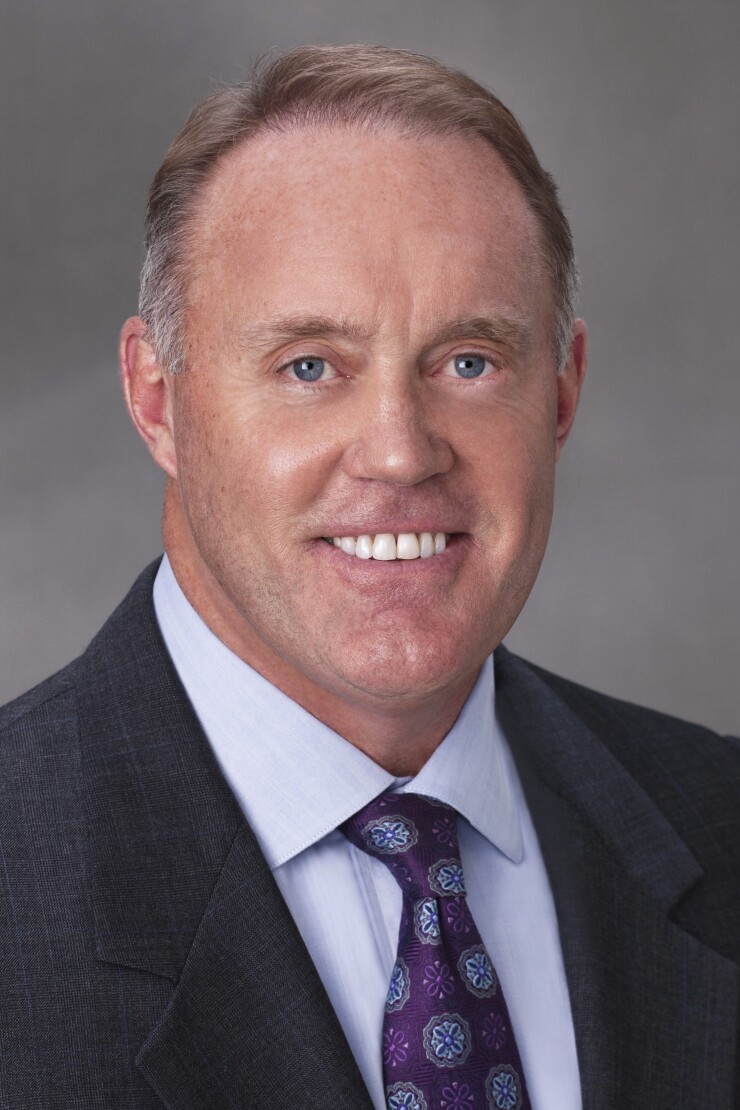Years after switching from professional football to finance, Tory Nixon aims to score big with the new digital banking strategy at Umpqua Holdings in Portland, Ore.
About 15% of bank customers predominately use mobile banking, based on a
Nixon, a former cornerback for the San Francisco 49ers who won a championship with the team in 1989, has a finance degree from San Diego State University.
Nixon was promoted to chief banking officer, a newly created position, in April. His job is to find ways to improve the customer experience by combining technology and traditional human interaction. He is also managing the combination of Umpqua’s customer-facing divisions, including mortgages, retail and commercial lending and wealth management.
Umpqua is a tech-forward company, forming Pivotus Ventures, a digital banking unit, in 2015.
“The customer really doesn’t think about us as ‘customer’ or ‘retail’ or ‘commercial,’ ” Nixon said in a recent interview. “They think of us as Umpqua Bank, and we need to think of ourselves as Umpqua Bank first. It’s critically an important element of what we’re trying to do here.”
The following is an edited transcript of the discussion.
Why did Umpqua decide to add a chief banking officer?
TORY NIXON: It was part of a longer journey for the company as we evolve in our strategy and as an organization. I think the need to take all of the customer-facing divisions of the company and put them under one individual makes a lot of sense for us. [We’re] essentially driving the customer experience in a way that’s differentiated from our competitors. It’s exciting for us. We have a lot of great associates. We’ve got a very interesting, innovative culture and organization and a great market, and kind of aligning all of those customer-facing teams in a way that supports the customer makes a lot of sense.

What are the components to Umpqua’s human-digital banking strategy?
There are basically three components. The first is organizational. How do we design teams that are nimble, responsive, collaborative, and customer-centric when we make decisions? The second is cultural. How do we create teamwork and behaviors that are full of trust and problem solving and develop of expertise in such a way that support each other and the customer? The third is our ability to create and develop products and services, whether they’re digital or in person, that reflect this human-centered approach to banking. It really is about taking all of our great associates, putting them together in a way that we’re serving the customer the way the customer wants to be served. Today, that’s probably more important than ever with the evolution of technology and innovation.
How is Umpqua’s human-digital approach different from other banks?
We’re not using the technology to drive customers from human interaction; we’re using the technology to support and create deeper, stronger relationships with our customers. Through the development and innovation of technology, and the investment and growth in our people, those two combined will provide us the opportunity to add more value, be more responsive, be quicker at decisions and essentially just provide a better experience. Certainly being able to provide a low-cost solution for a customer isn’t a bad thing. We just feel that there’s still a real need for our customers to have human interaction and to have that human interaction be with somebody who is skilled and knowledgeable and actually can add value to what they’re doing.
What do you think branches will be like in five to 10 years?
I think without a doubt the retail branch locations will be smaller in the future. They will certainly have the innovation and technology implanted … to provide a customer experience for those folks that want to walk into the retail branch locations. I think that’s a question that’s just going to have to be answered over the next few years in our industry.
What skills did you learn from professional football that will help you in your new role?
I think that there are a lot of similarities between athletics and business. Banking is a team sport. It’s having that trust and confidence in each other that your teammate will put the team first before they put themselves. I just feel very strongly in the concept that the team is more important than the individual and that we all win or lose together.
You can never stop getting better at what you do, whatever that is. And the smallest of details make the difference between winning and losing. I think that as any organization gets larger, there’s the opportunity for silos to develop, or a mentality that’s more selfish than it should be. I think that the idea of a chief banking officer, and putting the different customer-facing divisions together, it will be about how the customer wants us to serve them. We will lose any ideas of creating silos and we will lose any idea of being selfish. It will be about us together serving the customer.




